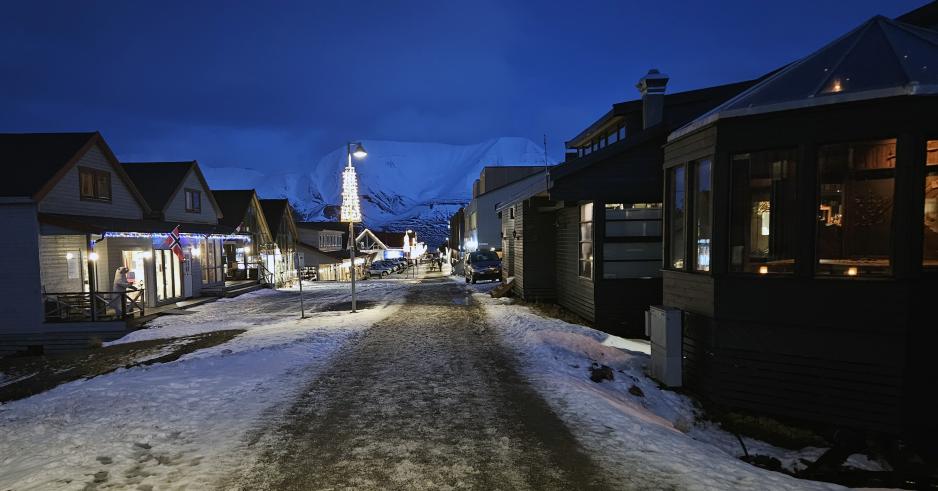Arne O. Holm says Longyearbyen, Svalbard, From Democracy to Aristocracy of Officials?

Longyearbyen heading into the Polar Night. (Photo: Arne O. Holm)
Comment, Longyearbyen: I borrow some life experience from a friend living a varied life in Longyearbyen. "There have been some downs," he said, adding, "But there sure have been some uphills as well." Surveys show that the local population is happy in the town, while the business sector struggles in a near-endless bureaucratic anthill.
This is a comment piece written by a member of the editorial staff. The comment reflects the writer's own opinions.
"We can present our views in many arenas, but they are seldom heard. When we enter the process, we feel like the decisions have already been made."
BalancingAct
The statement comes from Ronny Brunvoll, CEO of Visit Svalbard, the tourism industry's advocacy group.
I meet with him during a break in the presentation of a four-year-long research project, BalancingAct, which has explored the relationship between tourism and the government's regulation of it, among other things.
The project, which is a cooperation between businesses and researchers, is unique in the sense that it also researches the people in the actual Arctic. Such long research project are usually reserved for caribou and polar bears. The people, however, who live in the Arctic, we know surprisingly little about.
After a few days in a city heading into the pitch-black Polar Night that characterizes northern outposts, the tourism sector also takes a slightly gloomy look at the situation. Although, the industry earns its own money and has a turnover of NOK 1.3 billion a year.
Eagerly writing hearing responses.
Any mainland municipality with about 2,000 inhabitants would rejoice.
But that is not the problem.
Nor is the problem the industry's effort. I hardly know any business actors who tackle the challenges of running a business in what is politically aimed to be the world's best-managed wilderness with greater knowledge and experience.
Their own parliament representative
They regulate themselves, eagerly write hearing responses, and participate in dialogue meetings until their voice goes out.
The decisions have already been made.
He believes that a Svalbard parliament representative could be a solution, and if not this, then at least fill some of the knowledge gaps about life in Longyearbyen.
The desire illustrates a growing desperation on behalf of the inhabitants and the business sector.
"The government meetings are quite simply mock meetings," says Ronny Brunvoll.
"And that does not just apply to the tourism sector, but also other areas that affect life in the city."
It is easy to understand this frustration, which borders on pure mistrust of the government's eagerness to regulate. Proposals for regulation come as close as hail in an Arctic winter storm.
The industry can hardly adapt to the ever-changing regulations before new regulation rockets are launched from the Oslo bureaucracy toward Longyearbyen.
These regulations are rarely or never based on scientific knowledge or observations from those who spend time in the field in Svalbard.
Security policy
With war in Europe and Russia's presence in Svalbard, the security policy situation has made it easier to justify an increasingly firmer public grip on the businesses and people overall.
If one can call it justification.
What geopolitical significance is there in changing the limit for how close you can be to a walrus, or in chasing tourists and inhabitants up dangerous icefalls because of continuous bans on crossing sea ice on a snowmobile?
Regulation rockets are launched from the bureaucracy.
Those who make the rules have rarely, sometimes never, visited the areas they regulate. They can't read maps, and they don't listen to decades of local knowledge about weather conditions, climate, or animal life.
In reality, the government is about to reverse the local democracy implemented in Longyearbyen around the turn of the millennium. But not back to the mining town model, Company Town. At least that had some local anchoring.
The process is instead heading toward an aristocracy of officials, in which the politicians who make the final decisions do not have enough knowledge to stop the most anti-business proposals.
Getting fed up
Thus, the industry that has fulfilled political objectives to replace mining but obviously done the job better than what suits the capital is ravaged.
The industry must continue to be the pillar of the community, with tax revenues and offers like shops, cafes, and sports halls, all of which are necessary to populate an island strategically located in the far Arctic Ocean.
But it is becoming increasingly difficult to understand how the industry will solve its tasks and make money when the regulations are less predictable than a weather forecast for the next six months.
More and more people are becoming fed up and are considering liquidating their businesses.
And perhaps that is simply what the authorities' long-term goal is.



